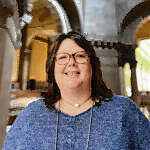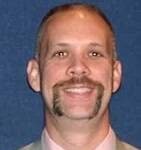WHEN it welcomed its first students in 1972, Columbus East High School was considered something of an experiment in the making. It had many of the characteristics of a traditional school, but there also were elements that suggested this particular education center would be different.
There was the open classroom concept, which at the time still was something of an untested way to educate children. There also was a planetarium, unheard of on most college campuses and difficult to imagine at the high school level. And then there was the television studio.
Let’s face it, there just weren’t too many high schools in Indiana that had a television studio in 1972. Heck, the number in the country probably could have been counted using the digits on a person’s limbs.
The studio wasn’t the only thing that marked East as different. There was the fellow who put it together and managed it through the rest of the 20th century and into the 21st — Vic Fields.
He retired after 32 years as a teacher in the Bartholomew Consolidated School Corp. in 2004. He returned to his hometown of Montezuma, not to sit back and enjoy retirement, but to continue a life of diverse involvement. He took the lead in developing the Parke County Learning Center — Ivy Tech Community College in Rockville and served as its director for several years. He was named 2013 Parke County Man of the Year and selected as the Distinguished Alumni Award winner from the former Montezuma High School.
It was a pretty full life that sadly ended last month. He died Nov. 29 at Union Hospital in Terre Haute. He was 71 years old. I doubt that he ever acted his age, even up until the end.
For much of his time in Columbus he was a fellow who talked fast and acted even more rapidly. It showed in the television studio that he shaped at East. He had been hired in the spring of 1972 as a television coordinator. It was a modest undertaking, and school officials initially envisioned it as a means to work with teachers in videotaping televised instructional programs that could be used in lecture classes and laboratory sessions.
Vic took it much further.
“To say the least, Vic was very creative,” recalled Phil Houston, one of his former principals. “He was always pushing for new technology. I still remember the day he came into my office and said, ‘Tell me your most memorable sporting event.’ I was a New York Yankee fan and said, ‘Don Larsen’s no-hit game in the 1956 World Series.’ He told me to come with him to the studio. When we got there, he punched some buttons on one of the consoles and all of the sudden I was watching a replay of Don Larsen’s perfect game.”
Phil used that as an illustration of Vic’s outside-the-box thinking. There were many more practical and adaptable aspects that his teacher used in education.
“He turned that studio into a hands-on classroom,” the retired principal said. “In a way it became a television station. The students developed their own news programs and covered the activities and personnel at the school much like the channels in Indianapolis and Louisville did. It inspired many of those students to take up careers in television and broadcasting.”
One of those students was Jen Watts Barrie, who went into a career in television production, at one time serving as a producer of programs on the Discovery and National Geographic channels. She has worked with noted food critic Anthony Bourdain.
“Actually, Jen attended North High School, but she drove over to East to take classes in the studio and work on the television crew,” said her mother, retired elementary teacher Sandy Watts. “Vic had quite an influence on her, and I remember that he arranged for her to work as a disc jockey for (Columbus radio station) WCSI at night and on the weekends. That really contributed to her confidence.”
Jen was just one of the students who was influenced by Vic. He didn’t just teach, but he also let the students learn. The relationship was more akin to a workplace in which the students were given both responsibilities and opportunities.
“I think the key was in Vic’s ability to relate to his students,” Phil said. “He had a way of holding their interest and making them feel in the end like they were actually doing the job.”
His ability in relating to students wasn’t limited to the high school level, and his involvement reached far beyond the walls of East. Sandy recalled a project she had undertaken when she was a teacher at Taylorsville Elementary School and her third-grade students wanted to begin a pen pal relationship with troops serving in the military during Operation Desert Storm.
“Vic came up to the school and worked with the kids in developing a video, sort of a newscast, which they used to bring a touch of home to those troops serving in Iraq and Kuwait,” she said. “I heard later from the commander of the unit we corresponded with (Richard Cody, who became a four-star general) that he still carried a copy of that video with him.”
In many respects, Vic was a man of eclectic tastes, literally. One aspect of his life took him into the kitchen, where he was regarded as an expert on baking bread. Each year he delivered a lecture on bread-baking techniques in the school’s culinary sciences program.
He also was fascinated with antique weaponry and shared that fascination with East students.
“He took that interest literally,” Phil said of the teacher, who in 2002 was named by the Columbus Area Chamber of Commerce as winner of the Edna Folger Award for outstanding teaching. “He would dress up in the garb of a 19th-century frontiersman — even with a fake beard that looked amazingly like the real thing — and go into classrooms to demonstrate what life was like back then. Some of the students even thought he was the real thing.”
Vic Fields was a lot of things to a lot of people. In all of them, he was a teacher.
Harry McCawley is the former associate editor of The Republic. He can be reached at [email protected].




